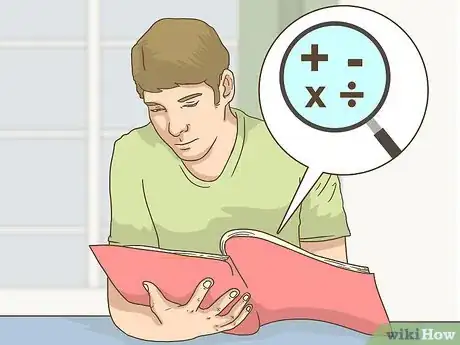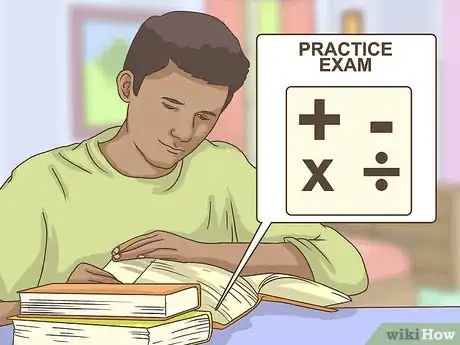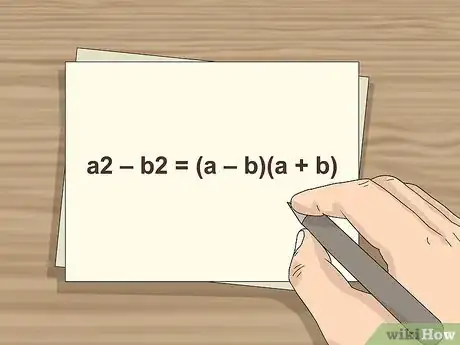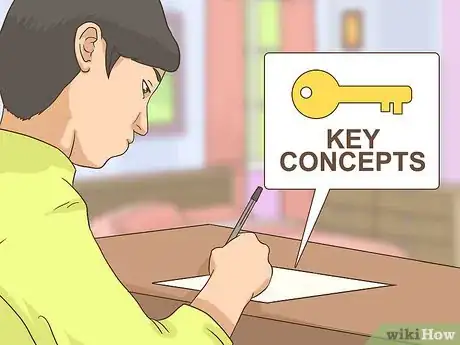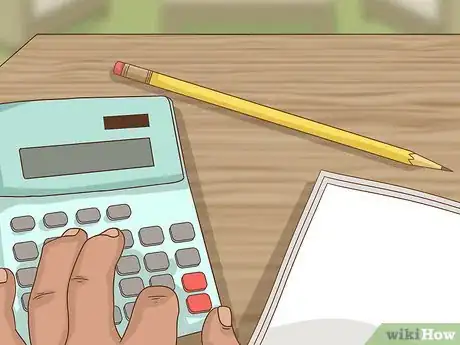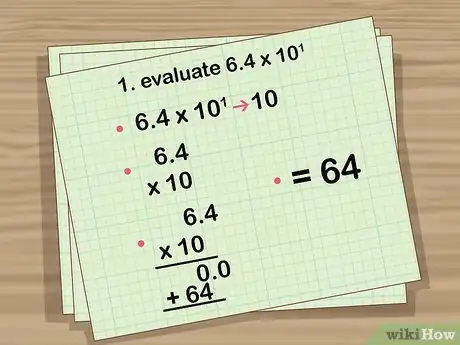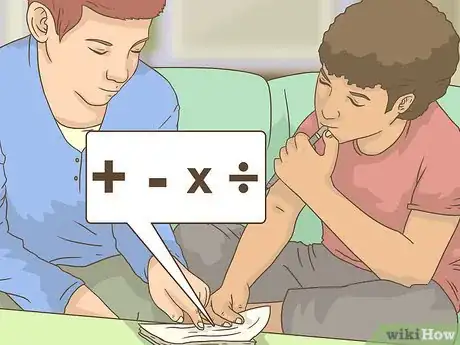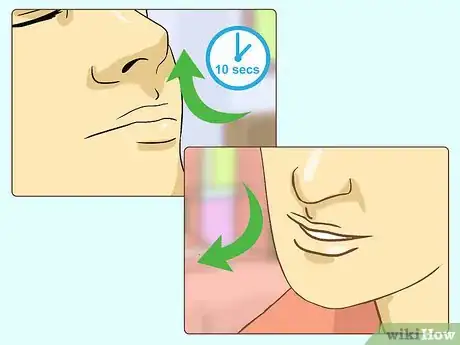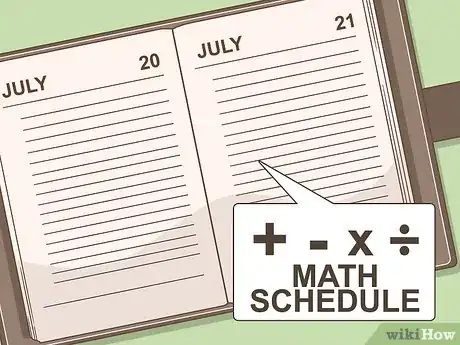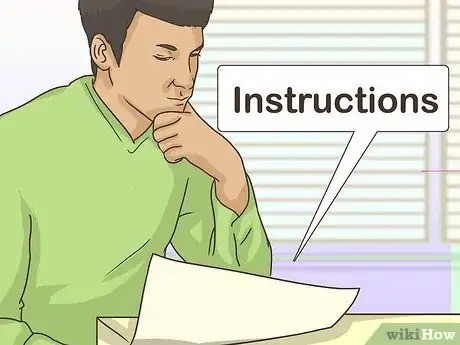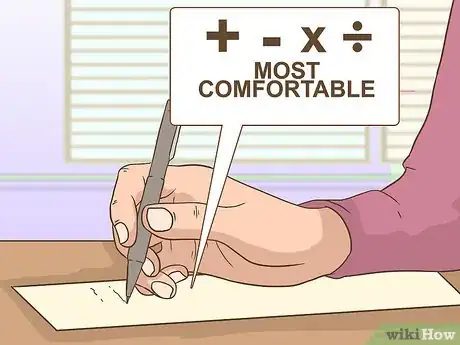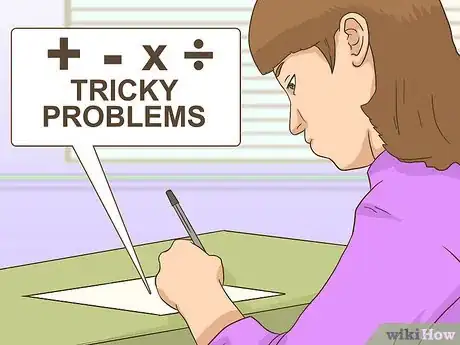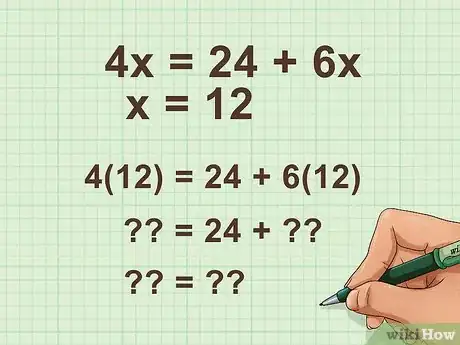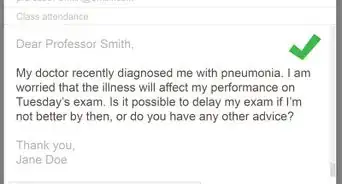This article was co-authored by Daron Cam. Daron Cam is an Academic Tutor and the Founder of Bay Area Tutors, Inc., a San Francisco Bay Area-based tutoring service that provides tutoring in mathematics, science, and overall academic confidence building. Daron has over eight years of teaching math in classrooms and over nine years of one-on-one tutoring experience. He teaches all levels of math including calculus, pre-algebra, algebra I, geometry, and SAT/ACT math prep. Daron holds a BA from the University of California, Berkeley and a math teaching credential from St. Mary's College.
There are 12 references cited in this article, which can be found at the bottom of the page.
This article has been viewed 27,048 times.
Taking a mathematics test or quiz can be stressful, especially if you have to cram right before the examination. Although one of the best study strategies is to begin studying early, sometimes that is not always possible. If you have to cram for a mathematics exam, make it easier to concentrate by gathering all your study materials and by eliminating distractions. If you rework your homework assignments, try to solve new problems, review key concepts, and take your time during the examination, you can successfully cram for a math test.
Steps
Reviewing the Course Material
-
1Study homework assignments and solutions. Your instructor may draw inspiration for problems and questions from your past homework assignments. Review your assignments, and pay close attention to any concept or problem that you struggled with. Familiarize yourself with these types of problems and questions in case you come across them on the exam.
-
2Rework the homework assignments. Write down the homework problems on a separate sheet of paper and return to it at a later time. Try to solve the problems again without referring to your homework assignment.[1] If you get stuck or get the incorrect answer, refer back to your assignment to check your work.Advertisement
-
3Practice sample problems or take a practice test. Look for sample problems in your textbook, workbook, or online.[2] Work through each of these problems individually, or use them to construct your own practice test. Try to work through these problems without referring to your study materials, books, or notes.[3]
- Practicing key concepts and reviewing the characteristics of each problem type will help you understand how to approach similar problems on the exam.[4]
-
4Make flash cards. If you need to memorize several formulas, theorems, or equations, write them on to flash cards to help you study. Flash cards have been shown to help improve your memory recall, so using them can help you remember key information. Review these cards before you go to sleep, and flip through them again right before the examination.[5]
-
5Write down key concepts and formulas.[6] After you have reviewed your assignments and completed several practice problems, begin to think about the key concepts. Ask yourself what the problem is solving for and the information needed to solve it. Make notes the describe each step, and highlight which rules and steps are the most challenging for you. Reiterating the steps for solving the problem will help you commit it to memory.
- If you are allowed to use notes during the exam, having a page that details how to solve the problem will be a huge help. It will also help remind you to review and check the steps that you have the most trouble completing.
- Writing down information with pen and paper can help you remember information more effectively than if you were only typing it. Writing helps the brain commit ideas, concepts, and information to memory and boosts your ability to learn.[7]
Studying Efficiently
-
1Collect your study materials. Having all your course materials on hand will help save you time and energy. Be sure to have your textbooks, study notes, study guides, and your course notes readily available so you won't waste time searching for them in the middle of solving an equation.
- Be sure to have a calculator, fresh pencils, and lots of paper handy, too.
-
2Have lots of examples on hand. Be sure to collect notes and worksheets that have examples of the equations and formulas you are studying in class. The more examples you have, the more you will be able to understand the steps for solving the problem. In addition, you will be able to recognize patterns, identify incorrect information, or spot common mistakes.
-
3Avoid distractions. Make sure your phone is turned off.[8] Keep the TV off while you're studying. These distractions shift your focus from studying, and they make it more difficult to absorb the information quickly.
- If you work better in a quiet environment, visit your local library or study hall at school to avoid interruptions and cram in peace.[9]
-
4Cram with your classmates. Studying with others can be an effective way to absorb material and learn new skills. Your friends or classmates may help you understand certain methods for solving math problems, or they may share some tips and tricks of their own for solving the equations.[10] If you study well with others, consider asking some of your classmates to join you in a study session at the library or a nearby coffee shop.
-
5Practice breathing deeply. Cramming for an exam can be stressful, so make sure you are taking breaks and allowing yourself to relax by taking deep breaths. Take a slow, deep breath in through your nose and hold for ten counts. Exhale slowly through your mouth, and wait a few seconds before taking another deep breath.[11] Practicing deep breathing can help increase optimism and help you control your emotions, which is helpful during a stressful cramming session.[12]
-
6Avoid cramming for exams when possible. Cramming for an exam can cause stress and prevent you from adequately retaining the information.[13] Make plans to study for your math tests over several weeks instead of waiting until a day or two before an exam. Having scheduled, regular study sessions will help you understand the material more thoroughly, and it will give you time to you to talk to your instructor if you don't understand something fully.[14]
- Create a math study schedule. If you make and follow a study schedule, it will become a part of your regular routine. Decide how many days per week you should study and find free time in your schedule. If you are a morning person, plan to review your notes during breakfast. If you work best in the evening, set aside time to practice sample problems after dinner.
Taking the Examination
-
1Get some rest before the exam. Try to get a good night's sleep before your exam so you will wake up feeling refreshed and sharp.[15] Your memory recall works best after you have had quality rest, so forego the all-nighter and plan to get some sleep.
- Try to get 8 to 9 hours of sleep.
-
2Have a light breakfast. Fueling your body is also key for keeping your mind sharp during an exam. Have a light, protein-filled breakfast. Enjoy some yogurt with fruit or some scrambled eggs and toast. Avoid eating a large, heavy meal, which might make you feel tired and sluggish during the exam.[16]
-
3Read the instructions. Before you begin solving problems, read through all the instructions and be sure you understand what is required. You do not want to misinterpret the problem and miss a crucial step.
-
4Solve the problems you are most comfortable with first. To make the most of your time, scan through the entire exam first and find the problems that you are most comfortable solving. If you are struggling with a particular problem, skip it and return to it later. Working through the easier or shorter problems will not only save you time, but it will help get you warmed up to tackle the more difficult, longer, or more complicated problems.
- Make sure your handwriting is clear and legible so that your instructor can fairly and accurately assess your efforts.
-
5Tackle the tricky problems last. After you have completed the math problems that you are comfortable solving, switch your focus toward the most difficult problems. You will be able to use your remaining time to concentrate solely on these more difficult, complicated equations.
- If you are solving the problems on a separate sheet of paper, be sure you have written down the equation correctly.
-
6Try to get partial credit. If you cannot complete a problem or you get stuck, don't erase the work you have done and leave it blank. You may be able to get partial credit for some of the work you have completed. Write a note that explains what your thought process was for that particular problem, or briefly explain what you were trying to do and why you got stuck. Your instructor may award you a few points for your attempts, and they will be able to help you understand where you went wrong after the exams have been graded.
-
7Stay for the entire duration of the exam. Even if you finish the exam early, stick around and wait until the end of the allotted time before you submit the test. You may remember an important concept, or you might review a completed problem and realize you worked through it incorrectly.[17]
- Be sure to review and check each problem before submitting the exam.
Community Q&A
-
QuestionHow do I study using practice problems?
 Daron CamDaron Cam is an Academic Tutor and the Founder of Bay Area Tutors, Inc., a San Francisco Bay Area-based tutoring service that provides tutoring in mathematics, science, and overall academic confidence building. Daron has over eight years of teaching math in classrooms and over nine years of one-on-one tutoring experience. He teaches all levels of math including calculus, pre-algebra, algebra I, geometry, and SAT/ACT math prep. Daron holds a BA from the University of California, Berkeley and a math teaching credential from St. Mary's College.
Daron CamDaron Cam is an Academic Tutor and the Founder of Bay Area Tutors, Inc., a San Francisco Bay Area-based tutoring service that provides tutoring in mathematics, science, and overall academic confidence building. Daron has over eight years of teaching math in classrooms and over nine years of one-on-one tutoring experience. He teaches all levels of math including calculus, pre-algebra, algebra I, geometry, and SAT/ACT math prep. Daron holds a BA from the University of California, Berkeley and a math teaching credential from St. Mary's College.
Academic Tutor Work on one practice problem at a time and instantly check the answer key to see whether you got the answer right or wrong. If you get the problem wrong, you can try again and focus more on that area.
Work on one practice problem at a time and instantly check the answer key to see whether you got the answer right or wrong. If you get the problem wrong, you can try again and focus more on that area. -
QuestionWhat do you study for math?
 Daron CamDaron Cam is an Academic Tutor and the Founder of Bay Area Tutors, Inc., a San Francisco Bay Area-based tutoring service that provides tutoring in mathematics, science, and overall academic confidence building. Daron has over eight years of teaching math in classrooms and over nine years of one-on-one tutoring experience. He teaches all levels of math including calculus, pre-algebra, algebra I, geometry, and SAT/ACT math prep. Daron holds a BA from the University of California, Berkeley and a math teaching credential from St. Mary's College.
Daron CamDaron Cam is an Academic Tutor and the Founder of Bay Area Tutors, Inc., a San Francisco Bay Area-based tutoring service that provides tutoring in mathematics, science, and overall academic confidence building. Daron has over eight years of teaching math in classrooms and over nine years of one-on-one tutoring experience. He teaches all levels of math including calculus, pre-algebra, algebra I, geometry, and SAT/ACT math prep. Daron holds a BA from the University of California, Berkeley and a math teaching credential from St. Mary's College.
Academic Tutor Focus on the key concepts and formulas you've been learning in class that will be covered on the test. Then, do practice problems to help you master these skills.
Focus on the key concepts and formulas you've been learning in class that will be covered on the test. Then, do practice problems to help you master these skills.
References
- ↑ http://tutorial.math.lamar.edu/Extras/StudyMath/StudyForExam.aspx
- ↑ Daron Cam. Academic Tutor. Expert Interview. 29 March 2020.
- ↑ http://tutorial.math.lamar.edu/Extras/StudyMath/StudyForExam.aspx
- ↑ https://www.goconqr.com/en/examtime/blog/how-to-study-maths/
- ↑ http://www.coolmath.com/studytip
- ↑ Daron Cam. Academic Tutor. Expert Interview. 29 March 2020.
- ↑ http://www.medicaldaily.com/why-using-pen-and-paper-not-laptops-boosts-memory-writing-notes-helps-recall-concepts-ability-268770
- ↑ Daron Cam. Academic Tutor. Expert Interview. 29 March 2020.
- ↑ http://www.educationcorner.com/habits-of-successful-students.html
- ↑ http://www.educationcorner.com/studing-groups.html
- ↑ https://www.anxietybc.com/sites/default/files/CalmBreathing.pdf
- ↑ http://www.emmaseppala.com/benefits-breathing-scientific-benefits-breathing-infographic/
- ↑ http://education.seattlepi.com/disadvantages-cramming-tests-2665.html
- ↑ http://www.educationcorner.com/habits-of-successful-students.html
- ↑ https://www.princetonreview.com/college-advice/acing-your-midterm-exam
- ↑ https://www.princetonreview.com/college-advice/acing-your-midterm-exam
- ↑ https://www.princetonreview.com/college-advice/acing-your-midterm-exam
